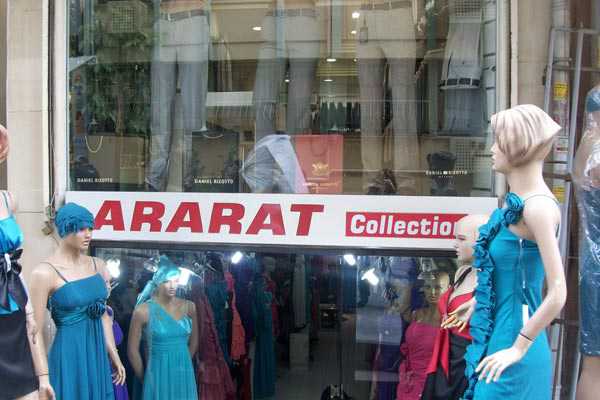ArmeniaNow reporter, writing from Istanbul, Turkey

Istanbul’s Laleli market is the most liberal place in Turkey. It is an international trade area where migrants from almost all former Soviet states work side by side with complete disregard to whatever differences on ethnic grounds they may have for one sole reason – commerce.
One of Turkey’s national symbols – its language – has even been sidelined; if in other districts of Istanbul one can hardly find road signs and signboards in any language other than Turkish or people that would agree to give directions to a tourist in English, in Laleli all signs are in Russian, which is also the common language of communication there.
Turkish vendors, too, learn and speak Russian.
Ramazan, 68, in quite a fluent Russian invites to his shop, presents the merchandize and explains that if he hadn’t learned Russian he wouldn’t have been able to do his business.
“It might seem strange that living in my own country I have to learn a foreign language in order to succeed in my business, but it’s the reality: in our work we are mainly dealing with representatives of former Soviet countries, and so we have adjusted to the rule,” Ramazan, who was born in Izmir and has worked as a salesman at the Istanbul market for the past 15 years, told ArmeniaNow.
Laleli, which looks like a small model of the Soviet Union, consists of several streets where clothes and footwear are mainly for wholesale; the area also boasts restaurants and hotels, like a giant shopping mall.
Although smaller by its size when compared to the famous tourist destination – the Grand Bazaar with its historic part that was built back in the 15th century as commissioned by Sultan Mehmed – it is, nevertheless, unique and important by its internationalism.
Laleli is the first haven of labour migrants arriving in Istanbul, since the language is not an issue and there is a demand for Russian-speaking workers.
“Only those who cannot find a job elsewhere end up coming here: if through acquaintances they are able to get employed at factories or locals’ houses – as cleaners, nannies or nurses for sick people – they can earn more, between $800-1,000 per month,” says Nana, a Georgian woman who has been working in Turkey for a year: her husband and she lost their jobs in Tbilisi following a reform in the police system there.
Azeri Mursal Ismamedov says that the best working partners are Armenians: “They are the ones mostly selling my merchandise, bringing major buyers from Armenia, so no ethnicity issue matters here, we have other things to worry about.”
Ismamedov has lived in Turkey for the past decade and lists the names of his friends among whom there are more Armenians than Turks or Georgians.
“When I was starting my business, my Turkish friends’ first piece of advice was to work with Armenians as they are the most reliable. So I followed their advice and have not once regretted since,” Ismamedov told ArmeniaNow. (At the market the Azeri translates for many of the Turks and teaches them Russian.)
There aren’t so many Armenians at this market. Sona, from Vanadzor, says Armenians are mainly at the market of another district, although the majority finds employment at factories and private houses.
“Armenian new-comers, who do not know the language, instead of coming here rather prefer working at the houses of Istanbul Armenians, whereas Georgians, Uzbeks, Moldovans do not have such an opportunity,” says Sona, adding though that it is not only a matter of language.
“Strangely so, but Turks trust Armenians more,” she says.
Labour migration has become one of the main survival means for many in post-Soviet countries after the collapse of the Soviet Union.
However, if in the beginning the main country for labour migration was Russia, during the past decade Turkey, too, has become a country providing jobs and earning opportunities.
According to the data of the Turkish Ministry of Labour and Social Affairs, there are around one million migrants working in the country, although experts believe the actual number is even higher.
“This phenomenon has two sides to it: on the one hand we are proud of our country to have developed such an economic capacity to be able to receive so many migrants, but on the other hand, since migrants are a more affordable manpower, they literally take away jobs from citizens of Turkey,” Fatih Osman, an expert at Sabanc university’s center for economic research, told ArmeniaNow.
If in the 1970s Turkish citizens were migrating en masse from the country (mainly to Germany), today Turkey has become a country that attracts migrants.
However, in the early period of the global financial-economic crisis, when jobs were cut by 15 percent in 2009 only in this country with a population of 70 million, the government decided to do the lay-offs at the expense of migrants.
According to the 2009 study by the Ministry of Labour and Social Affairs, if the state got rid of illegal migrants, it would have opened up an additional 500,000 workplaces, however this plan was never implemented because of the criticism it evoked on the part of major factory owners who were able to overcome the economic crisis due to non-expensive manpower.
“For a period of time it was rather tense here, deportation cases were frequent, but no matter how tense it might be, it is still much safer here than in Russia, and Caucasians, even Armenians, get a much better treatment here,” says Sona.
Gayane Abrahamyan is reporting from Turkey with the support of the Global Political Trends Center (GPoT) and Internews Armenia

Leave a Reply